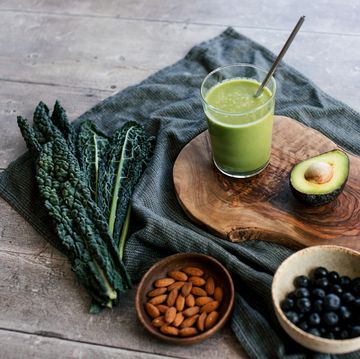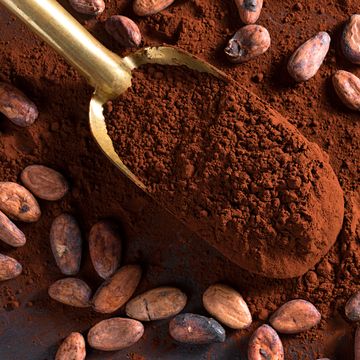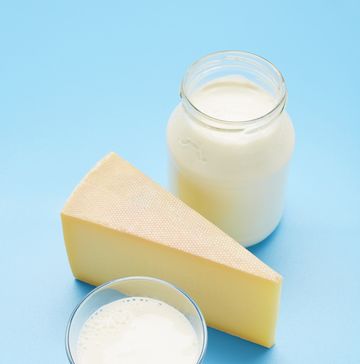You’d be forgiven for asking: what T actual F is a custard apple?
Also known as bullock’s heart (we’re not kidding you — we didn’t think it could sound any less appealing either), custard apple is a fruit. They are oval, heart-ish in shape, with indentations on the tough skin, and the texture inside is creamy and sweet — like… you guessed it: custard, which smells a bit like vanilla. Though it sounds pretty wild, it’s not totally dissimilar to banana and pineapple.
Originating in South America and the Caribbean, custard apples are surprisingly versatile. Step one always involves removing the skin (think dinosaur — thick and tough) and seeds, which aren’t edible. But step two can go a lot of ways — eat chilled with a spoon, add to savoury dishes, like stir-fries, salads or curries, chop onto yoghurt, whizz into smoothies or make into sweet bakes, like muffins, pies, cakes or tarts.
Custard apple benefits are wide-ranging, thanks to their levels of fibre, vitamins and minerals. Let’s discuss…
1. High in antioxidants
Studies show custard apples are high in free radical-fighting antioxidants — in kaurenoic acid, flavonoids, carotenoids and vitamin C , meaning they help protect cells against oxidative stress which can cause ageing and cancer.
2. High in mood-boosting B6
With just one cup containing nearly a quarter of our RDA of B6, which increases mood-regulating neurotransmitters or ‘happy hormones’ serotonin and dopamine, custard apple could help maintain mental health. Studies have shown links between low B6 levels and mood disorders, such as depression, especially in older people.
3. Improve eye health
Custard apples are high in vitamin B2 (aka riboflavin) and lutein, a carotenoid and the main antioxidant involved in maintaining healthy vision, which studies show helps protect against cataracts and age-related degeneration.
4. Boost collagen
It’s thought that custard apple could boost collagen production, keeping skin looking young and healthy, as well as slow down its natural collagen loss.
5. Improve digestion
High in fibre, with 11mg in a cup — custard apples may help with the smooth running of the digestive system, research shows, as well as improve the gut microbiome by feeding the good bacteria and producing short-chain fatty acids (SCFAs). SCFAs are thought to protect against inflammatory bowel diseases, such as Crohn’s.
6. Improve liver health
Custard apple leaves have been shown to benefit liver health due to bioactive compounds that may have protective effects on the cells, against oxidative stress.
7. Support heart health
The high levels of fibre and antioxidants in custard apples, most noteworthily polyphenols, are known to improve cardiovascular health, reducing inflammation and oxidative stress — both which can increase risk of heart disease.
8. High in immunity-boosting vitamin C
Custard apple packs a vitamin C punch, known to boost immunity by fighting infection — even thought to potentially shorten cold symptoms.
9. Prevent high blood pressure
High in potassium (one cup contains 617.5mg — 10% of RDA) and magnesium (one cup contains 52.5mg — 6% of RDA), nutrients which are known to help regulate blood pressure, it’s thought consuming custard apples could help dilate blood vessels, thereby lessening the risk of heart disease and stroke.
It’s worth noting that custard apple contains a toxin, present in all Annona species, a long-chain fatty acid (LCFA) called annonacin — so make sure you remove the skin and stones, and consume in moderation. This is also advisable as, despite all these superstar benefits, they are high in calories and sugar.













